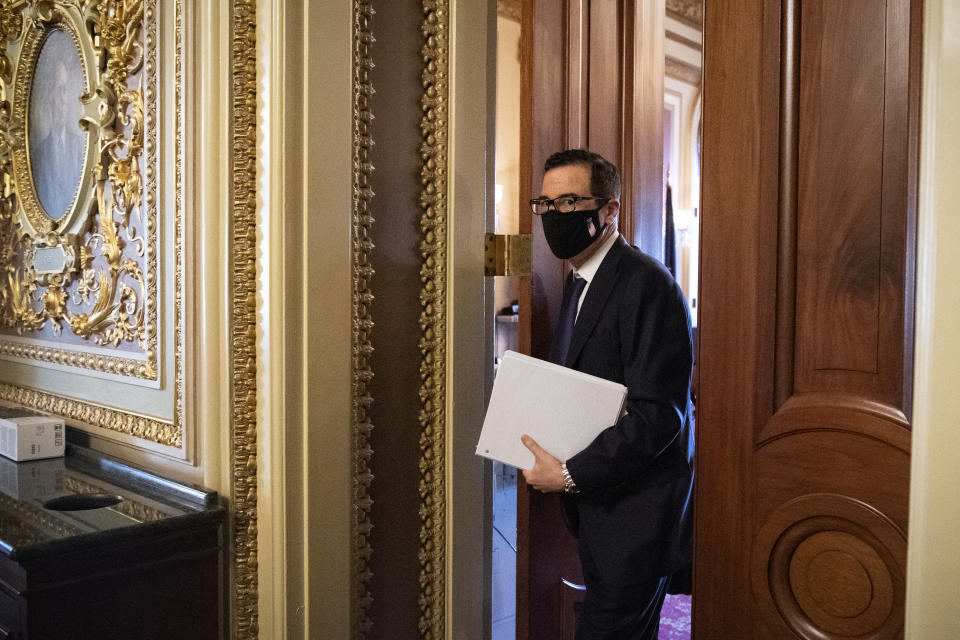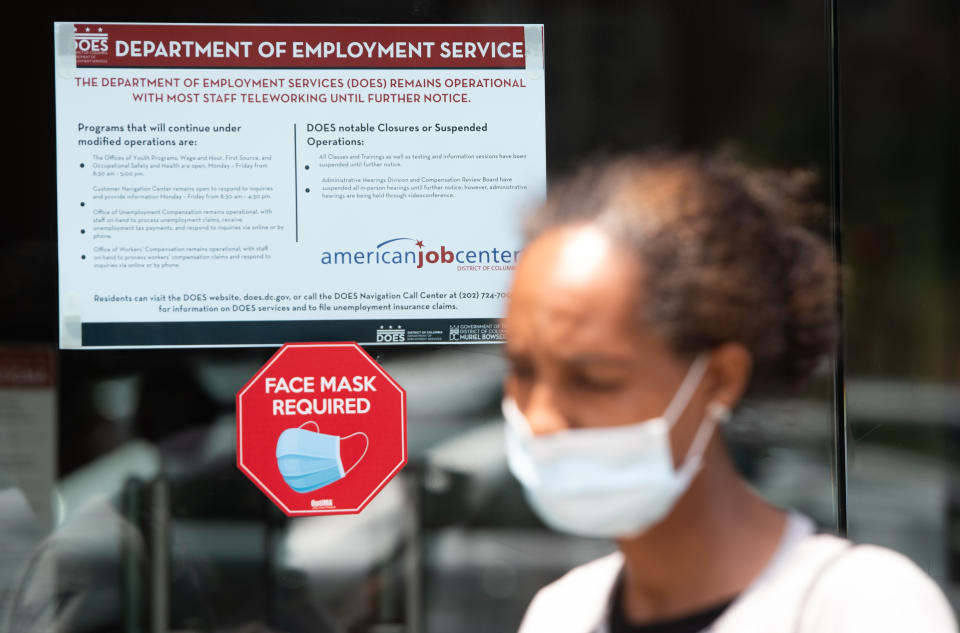Coronavirus stimulus: GOP plan for unemployment benefits hits snag over 'mechanical issues'
The GOP’s potential plan to extend emergency jobless benefits has been complicated by the antiquated unemployment systems in many states, likely delaying the Republicans’ stimulus proposal that was expected this week.
"We aren't going to extend it on the base wage replacement, it's approximately 70% of wage replacement,” Treasury Secretary Steven Mnuchin said on Thursday. “We're dealing with the mechanical issues associated with that."
Read more: Everything you need to know about the extra $600 in unemployment benefits
The Trump Administration and Republicans would like to provide extra unemployment benefits that replace 70% of a worker’s lost wages, instead of sending each jobless American the same flat amount, resulting in some getting more in benefits than what they earned on the job. This would replace the extra $600 in weekly benefits under the CARES Act that expire on July 31.

But the plan likely will stress already overburdened state unemployment agencies that are processing historic numbers of claims each week.
“The reason why we went with $600 a week originally was precisely because a lot of states could not target wage replacement rates,” said Ernie Tedeschi, an economist at Evercore ISI. “And so $600 a week was the easier way to augment benefits.”
Why a 70% replacement rate?
At first, it appeared that Republicans would simply propose to lower the weekly amount sent to jobless Americans — on top of their regular state benefits — to $200 from the original $600. The added benefits will be the same in all states and not differ based on income.
“The way Mnuchin talked about it suggests they might be doing it in a different way,” Tedeschi said. “It wouldn't be $200 a week for everyone.”

But a draft of the GOP’s plan put forth a second option, according to a copy obtained by Yahoo News. That option is a more targeted approach where the additional benefits will vary depending on how much you made before and how much your current regular benefits are.
“They’re thinking about doing 70% of the amount,” President Donald Trump said at a White House press conference on Tuesday. “The amount would be the same, but doing it in a little bit smaller initial amounts.”
It also prevents jobless workers from receiving more on unemployment insurance than what they earned before, a major GOP criticism of the original emergency benefits that Republicans claimed kept Americans from returning to their jobs.
The median income replacement rate was 134% with the added $600 weekly benefits, according to a paper from Becker Friedman Institute at the University of Chicago. The average unemployment insurance replaces around 46% of previous income, according to the Center on Budget and Policy Priorities.
Can the targeted approach work?
A similar plan was on the table when the government was first deciding how to increase unemployment benefits in March, but not all states could implement it then. It appears the problem hasn’t been solved.
Talking about the “mechanical issues” Mnuchin acknowledged that “some states can implement this quickly, some states will take time,” he said.
“Not all states are able to target a wage replacement rate you know as a percent of what you made before,” Tedeschi said. “The question would be what they want to do for those states that aren't able to implement that.”
Some states struggled with just disbursing the additional flat $600 unemployment benefits extra introduced under the CARES Act as they wrestled with reprogramming their computers that depend on a 60-year-old programming language.
Read more: Do you have to pay taxes on unemployment benefits?
“I don't think anything has dramatically changed,” Tedeschi said. “I seriously doubt that states have changed their computer systems over the last couple of months to be able to suddenly target wage replacement rate.”
Short-term extension for now?
It’s unclear whether a new stimulus package that addresses the future of unemployment benefits will happen before the July 31 expiration deadline. Until a deal can be struck, though, the GOP is also considering a temporary extension of at least some of the unemployment benefits.
“If we can't get it all done by next week, we cannot allow there to be a cliff in unemployment insurance given we're still about 11% unemployment, about 17 million Americans out of work some through no fault of their own," Sen. Rob Portman (R-OH) told reporters on Wednesday. “So I think we should do something.”

Democrats including House Speaker Nancy Pelosi didn’t support the suggested short-term extension by Republicans saying, “we cannot piecemeal” a deal on stimulus. Senate Minority Leader Charles Schumer also didn’t support the idea saying you can’t “take care of one portion of suffering people and leave everyone else hanging.”
The White House also doesn’t favor a short-term patch.
“I think it’s the administration’s position that we look to address this in a longer term manner,” Mark Meadows, the White House chief of staff, told Politico’s Jake Sherman. “Having some short term extension of UI, or unemployment insurance benefits, just to allow for a longer negotiation is certainly not worthy of consideration. Especially since we’re not even in negotiations.”
Denitsa is a writer for Yahoo Finance and Cashay, a new personal finance website. Follow her on Twitter @denitsa_tsekova.
Read more:
Rich Americans' pullback in spending is hurting the economic recovery
Remote schooling leads to a 'shocking' disparity between rich and poor students
Read more personal finance information, news, and tips on Cashay
Follow Yahoo Finance on Twitter, Facebook, Instagram, Flipboard, SmartNews, LinkedIn, YouTube, and Reddit.

 money
money 

